In November, activists in 15 cities across the UK covered billboards and bus stops with spoof HSBC adverts which accused HSBC of ‘climate colonialism’ and demanded that the bank end its financing of fossil fuels, detention centres and climate destruction.
Over 250 billboards, bus stops and Tube posters featuring HSBC advertisements were hijacked in a national grassroots campaign by Brandalism activists. Locations included Birmingham, Bristol, Carmarthen, Glasgow, Leeds, London, Oxford, Sheffield and Swansea.
The artworks also referenced HSBC’s significant investments in for-profit US prisons and detention centres which have been strongly criticised for separating families and using incarcerated migrants as a source of cheap labour.
Some contributing artists, such as Jimmy Cauty, referenced HSBC’s investments in major weapons companies like BAE Systems, whose munitions have been used to commit serious human rights abuses.
Climate criminal
HSBC has been accused of ‘climate colonialism’ because of its destructive investment portfolio, which ravages land and indigenous communities, from gas extraction in Mozambique to funding coal projects in Bangladesh and deep-sea mining projects off Papua New Guinea.
Since the 2016 Paris Climate Agreement, HSBC has poured £67bn into fossil fuels. Despite making a public pledge in October to ‘reduce financed emissions from our portfolio of customers to net zero by 2050 or sooner’, HSBC continues to arrange major fossil-fuel-related loans – and has made no commitment to phase out coal, oil or gas financing in the near future.
In Mozambique, HSBC is bankrolling a liquid natural gas extraction project. In addition to the environmental destruction that fossil fuel extraction brings, the project has displaced over 550 families and evicted communities from their land and livelihoods, and brought increased militarisation to the area.
The project will bring no benefit to local communities, instead enabling multinationals like Shell and Total to extract Mozambique’s natural resources for export.
Anabela Lemos, director of Ja! Mozambique, who works with communities resisting the gas industry in Mozambique, said: ‘When banks like HSBC invest in the gas industry in Mozambique, they are just as responsible as the extractive companies like Total, Eni and Exxon for the irreversibly destructive impact on communities.
‘These companies are only able to construct this type of project, and step on thousands of communities – kicking them out of their homes and territories, destroying their livelihoods, their cultures, and their rights, and stealing their future – because irresponsible financiers like HSBC make it possible.’
Right of reply
Brandalism is an international network of artists who use ‘subvertising’ (subverting advertising) to unmask corporate PR campaigns.
Tona Merriman at Brandalism, said: ‘Advertising is a key mechanism for big banks to shore up their public image. HSBC likes to position itself as a friendly high street bank through its marketing, but these artworks tell a much darker tale of human rights abuse facilitated by the bank’s activities.
‘When advertising agencies launder their clients’ reputations, it skews public debate on substantive issues like climate change, human rights and colonial oppression.
‘While the number of people switching to HSBC increased 140 percent as a result of their ads, did anything really change about the bank and the priorities of its finance? No. So we created a right of reply for the public, here and abroad, to provide a corrective to HSBC’s billboards.’


